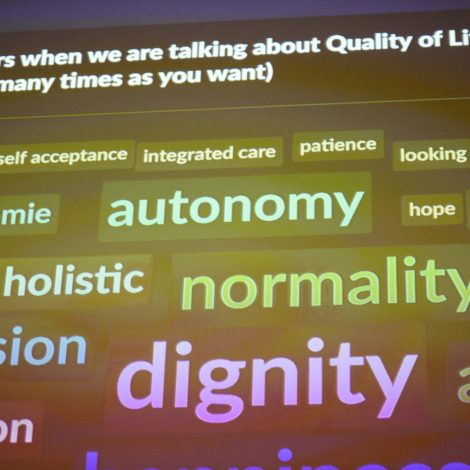Caregivers Can Help Preserve Alzheimer’s Patients’ Dignity
Written by |

(Photo by Larry Luxner)
Dignity diminished
Alzheimer’s disease has a way of robbing a person’s dignity. Given enough time, it strips away what is basic to our loved one’s personality, including the very characteristics associated with dignity. It replaces their normal reserve, appearance, language, and seriousness of manner with odd behavior that is out of alignment with their character.
Dignity isn’t earned
We can’t stop the robber from stealing these characteristics; however, there is a second definition on which caregivers can and should focus. This definition infuses hope: Dignity is “the quality or state of being worthy, honored, or esteemed.”
Dignity doesn’t depend on cognitive ability, just as a person’s worth isn’t reliant on what they can or cannot remember. Being dignified and having dignity are two different things. A person without cognitive ability might exhibit less dignified behavior, but they are still worthy of honor and esteem.
Competent, loving caregivers preserve the dignity of the person under their care.
Through conversation
Preserve dignity by speaking kindly. Actions may speak louder than words, but there is also a direct correlation between respect or a lack of respect and how we converse with our loved ones.
Yes, answering the same question over and over again can get annoying. Your parent, spouse, or child can’t control short-term memory loss, but you are in control of how you react. Respond with respect and insist that others do the same.
Additionally, when the person is present, avoid speaking about them as if they weren’t there. Include them in the conversation at the doctor’s office, with the server at the restaurant, etc.
During personal, intimate caregiving duties
Imagine losing the ability to complete personal tasks. You would have to learn to trust someone else with the responsibility.
The required tasks are often intimate in nature, involving personal hygiene or health-related issues. Preserve your loved one’s dignity by keeping personal information private.
Do not speak about matters of an intimate nature to other people, except perhaps to a healthcare professional, and only when it becomes necessary.
Treat others the way you want to be treated
The Golden Rule is a good rule of thumb: “Do unto others as you would have them do unto you.”
Which would you prefer, to be the recipient of care or to give it? How would you want to be treated by a caregiver if the tables were turned? Regard your loved one accordingly.
A person’s physical or mental state doesn’t define their worth. Dignity is a state of being, a right belonging to everyone. Caregivers are the safeguards.
***
Note: Alzheimer’s News Today is strictly a news and information website about the disease. It does not provide medical advice, diagnosis, or treatment. This content is not intended to be a substitute for professional medical advice, diagnosis, or treatment. Always seek the advice of your physician or other qualified health provider with any questions you may have regarding a medical condition. Never disregard professional medical advice or delay in seeking it because of something you have read on this website. The opinions expressed in this column are not those of Alzheimer’s News Today or its parent company, Bionews Services, and are intended to spark discussion about issues pertaining to Alzheimer’s Disease.






Leave a comment
Fill in the required fields to post. Your email address will not be published.